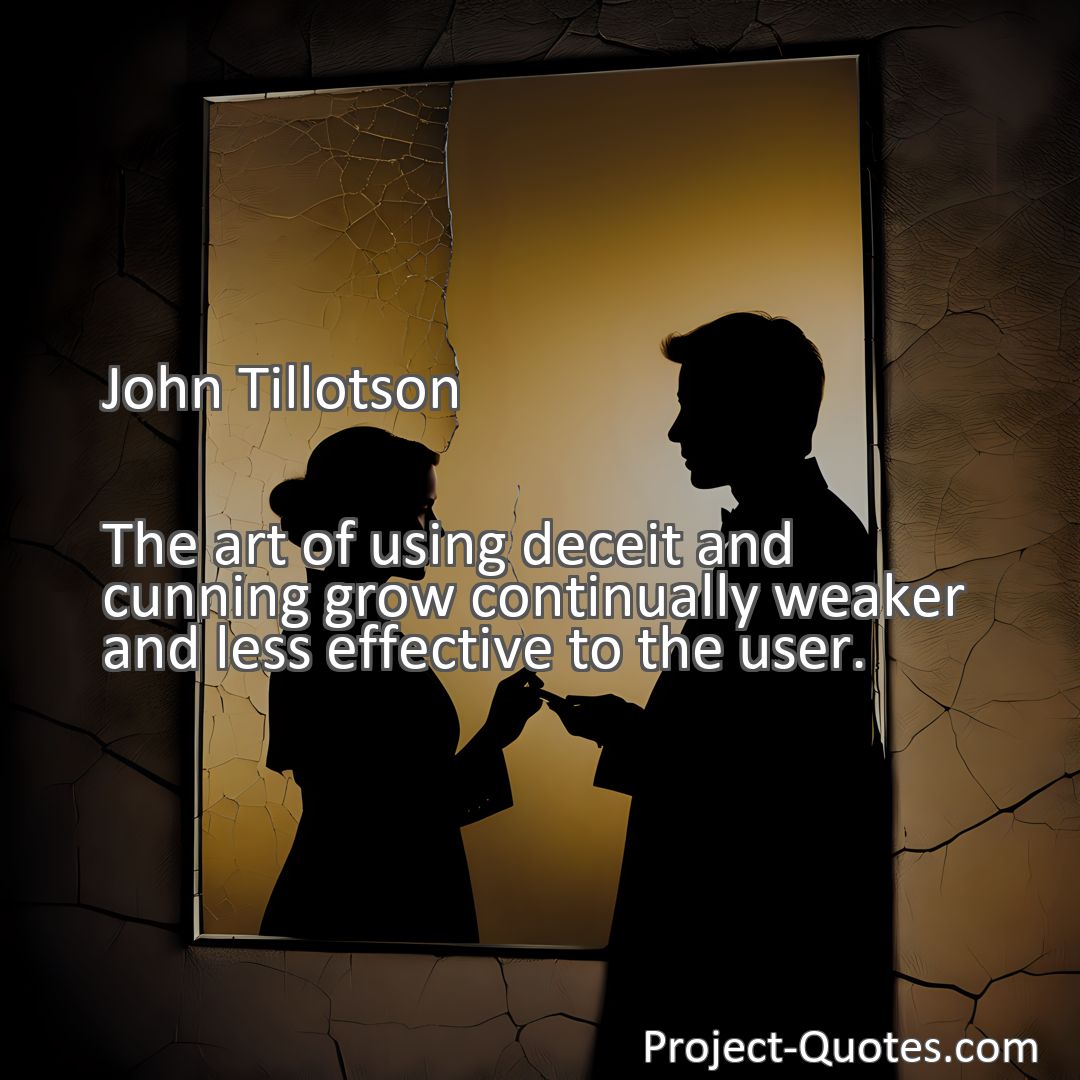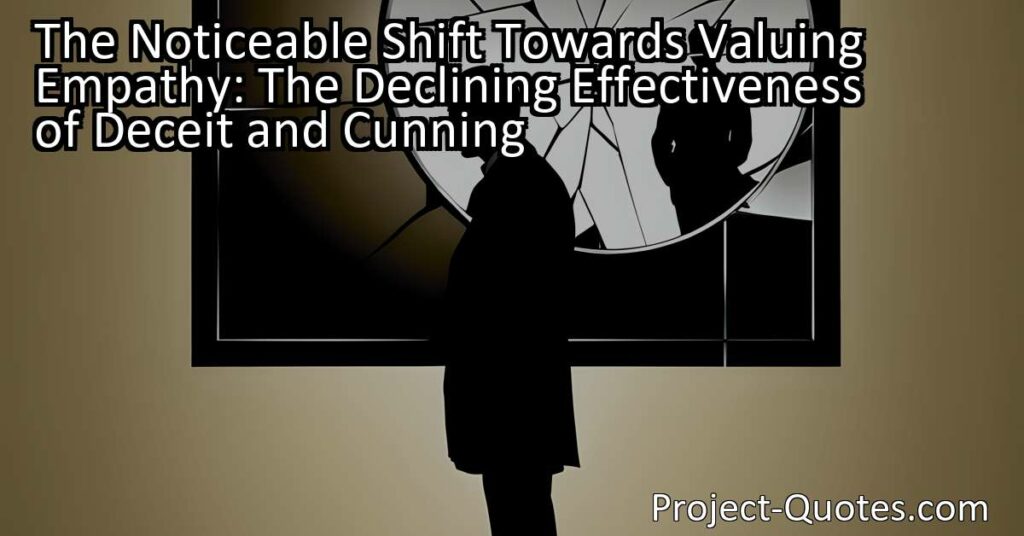The art of using deceit and cunning grow continually weaker and less effective to the user.
John Tillotson
The Noticeable Shift Towards Valuing Empathy: The Declining Effectiveness of Deceit and Cunning In today’s connected world, deceit and cunning are becoming less powerful and effective. Advancements in technology, the erosion of trust, and the growing emphasis on emotional intelligence and authenticity are contributing to this shift. As society values empathy, collaboration, and transparency more, individuals who prioritize genuine connections and personal growth are the ones more likely to achieve long-term success and maintain fulfilling relationships.
Table of Contents
Meaning of Quote – The art of using deceit and cunning grow continually weaker and less effective to the user.
Expanding on the Idea:
“The art of using deceit and cunning grows continually weaker and less effective to the user.” – John Tillotson
Deception and cunning are often considered as means to achieve personal gain or advantage over others. However, John Tillotson suggests that as time goes on, these tactics become less powerful and less effective. This idea challenges the notion that deceit and cunning can guarantee success in various aspects of life. By exploring the reasons behind this statement, we can gain a better understanding of the importance of honesty, empathy, and genuine effort, rather than relying on manipulative strategies.
One reason for the diminishing power of deceit and cunning lies in the advancements of society and technology. In today’s highly connected world, information spreads rapidly, making it harder to maintain a false façade. With the rise of internet usage, social media platforms, and instantaneous communication, people have become more cautious and cynical towards suspicious claims or manipulative tactics. Truth has become easier to uncover, exposing those who rely on dishonesty and cunning to achieve their goals.
Furthermore, deceit and cunning often lead to strained relationships and the erosion of trust. When someone consistently resorts to manipulation, their actions are bound to have consequences. In personal relationships, trust serves as the foundation on which strong bonds are built; however, deceitful behavior slowly erodes that foundation, leaving relationships fragile and unstable. People tend to distance themselves from those who exhibit dishonesty, opting instead for genuine, trustworthy individuals who prioritize open communication and integrity.
In a professional context, the use of deceit and cunning may lead to short-term gains but hinder long-term success. While it’s true that maneuvering and manipulation can help one gain advantages in certain situations, consistently relying on these tactics can lead to a tarnished reputation. In contrast, individuals who demonstrate honesty, dedication, and respect for others often find themselves in positions of authority and influence. Employers value individuals who exhibit integrity and authenticity, as they contribute positively to the work environment and build stronger, more sustainable relationships with colleagues and clients.
One potential explanation for the declining effectiveness of deceit and cunning is the growing emphasis on emotional intelligence. Emotional intelligence refers to the ability to understand and manage one’s own emotions while also being aware of and empathetic towards the emotions of others. As society becomes more aware of the importance of emotional intelligence, people prioritize genuine connections and interactions based on empathy, rather than manipulation.
In recent times, there has been a noticeable shift towards valuing empathy, collaboration, and transparency. This shift is evident in the increasing focus on mental health, kindness campaigns, and the rise of teamwork-oriented workplaces. The ability to connect with others on an emotional level, consider their needs, and foster a sense of trust has become highly valued. Hence, individuals who employ deceit and cunning are gradually becoming less successful, as they fail to develop these essential interpersonal skills.
Another factor contributing to the weakening effectiveness of deceit is the increased cultural emphasis on authenticity and personal growth. Individuals are encouraged to embrace their true selves and develop their unique strengths and qualities. In this context, resorting to deceit and cunning contradicts the principles of personal growth and authenticity. Instead, individuals are encouraged to build their lives based on genuine intentions and actions, focusing on personal growth rather than achieving success through deceitful means.
It is also essential to consider the emotional toll that deceit and cunning take on individuals who employ these tactics. Constantly manipulating others can have detrimental effects on one’s mental and emotional well-being. The strain of maintaining a deceitful lifestyle and continually plotting for personal gain can lead to chronic stress, anxiety, and feelings of guilt. In contrast, individuals who prioritize openness, honesty, and empathy tend to have better mental health and enjoy more meaningful relationships.
In conclusion, John Tillotson’s quote regarding the decreasing effectiveness of deceit and cunning offers valuable insights into the importance of honesty, empathy, and authentic efforts. In an era where information is readily accessible and trust is highly valued, relying on manipulative tactics is becoming less fruitful. As society progresses, individuals who prioritize emotional intelligence, authenticity, and personal growth are the ones more likely to achieve long-term success and maintain fulfilling relationships. It is important to continuously reflect on our actions and ensure that we are contributing positively to our personal and professional lives, rather than relying on deceitful means for temporary gains.
I hope this quote inspired image brings you hope and peace. Share it with someone who needs it today!


